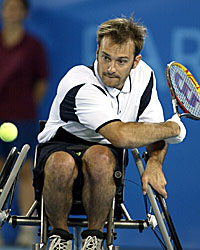

Alumni Gazzette
Top Seed, Gold Medal Spirit
by Tara Jeske
Graduate from college, play tennis, compete in international tournaments, win medals at the 2004 Paralympics. It’s the journey of David Wagner, a 2000 elementary education graduate, who is a silver and gold medalist in quad tennis.
 |
| With a silver win in quad singles, Wagner continues to train and compete, setting his sights on China in 2008. |
Tell me about the experience of playing
at the Paralympics in Athens. What was the single most exciting moment?
I would have to say that the most memorable moment for
me was entering the stadium for opening ceremonies. That was an awesome experience;
to walk into the sold-out stadium of 75,000 spectators while they are screaming
and yelling was a truly inspiring moment. And of course being the only U.S.
tennis athlete, able-bodied or disabled, to come home with two medals is very
memorable. It was especially sweet to have my family and friends there to
share this special moment.
Who is your doubles partner and how did
you begin playing together?
My doubles partner is Nick Taylor, of Wichita, Kan. We started playing together
a year and a half before the Olympics. We just both knew how our styles of
play would work together to be a strong team. He is able to run down balls
from behind the baseline and hit good shots that put our opponents on the
defensive, while I am at the net waiting to put the point away when the opportunity
arises.
How did you get involved in wheelchair
tennis?
I was playing tennis before I got injured, and afterwards I was looking for
a way to be active again. I found a brochure for a camp in Portland, Ore.
I attended the camp and fell back in love with the sport. I was fortunate
to have learned at that Portland camp from the quad world No. 1 at the time,
Rick Draney.
What are the differences, if any, between
wheelchair tennis and able-bodied tennis?
The only difference is that we are allowed a second bounce if we need it.
The first bounce must be within the regulation-size tennis court in either
singles or doubles—depending on what you are playing–then the second
bounce can be anywhere. The majority of the top players now, though, are taking
the ball on one bounce, which keeps the pressure on our opponents.
Some people may not fully understand the
term quadriplegic, thinking it means that you are unable to use your arms
as well as legs. Can you explain it?
Medically, a quadriplegic has all four limbs affected with paralysis. I broke
my neck at the C6 level, and as a result of that my hands and upper body remain
paralyzed. My hands function at about 30 percent of normal functioning hands.
My wrists are affected as well and are not as strong sideways and up and down
as before my accident. My chest and abdominal muscles are also paralyzed,
as well as my legs.
How did your life path change in 1995
when you had your spinal cord injury?
I believe that the accident opened doors that might not have been there otherwise.
I have been able to represent the U.S. all over the world at events that I
might not have been able to before. I am not sure that this accident changed
my plans as much as just slowed the outcome. I was able to graduate with an
elementary education degree from WWC in 2000, which is what I had planned
to study even before my accident.
I feel that I am still very much the same person I was before
becoming paralyzed.
I am now probably a little bit more mature as that comes with growing older.
When did you first realize that you were not just good but exceptional at
the sport?
I came home from the camp when I was still living in Walla Walla and attending
wwc. I was training every day on the tennis court, in the weight room, in
the pool, and with my hand cycle. I attended my first itf (International Tennis
Federation) world-ranked event that April in Baton Rouge, La., where I won.
I soon realized that I could go a long way in this sport as long as I stayed
healthy and trained hard, both of which I have done. It was when I beat the
current No. 1 player in the world at the Italian Open in August 2001 that
I knew I had what it takes.
What is your world ranking now in single
and double wheelchair tennis?
I am currently ranked No. 2 in singles and No. 1 in doubles.
What is your training routine?
A typical week for me will consist of three to four days on the court. This
court training is about two to three hours and includes mobility drills, pushing
patterns, and stroke production.
On top of this, I use weight training machines three times a week. Of course all upper body work usually takes about two hours each time. I also include cross training for my cardiovascular workout five or six days a week. I will play wheelchair rugby a couple times a week, swim, use the upper body ego meter, hand cycle, and just pushing.
Where are you scheduled to play in the
coming year?
I will play around 20 events worldwide next year. My web address is www.davidwagner.us.
On this site I have information on my sponsors, tournaments to be played and
already played, a link to follow my play at www.itfwheelchairtennis.com,
and a place to contact me.
What’s next for you after winning
gold and silver at the Paralympics? Do you plan to return?
As long as I am healthy and can continue to compete at a high level,
I will participate in Beijing in 2008. Only this time I plan to come home
with two golds.